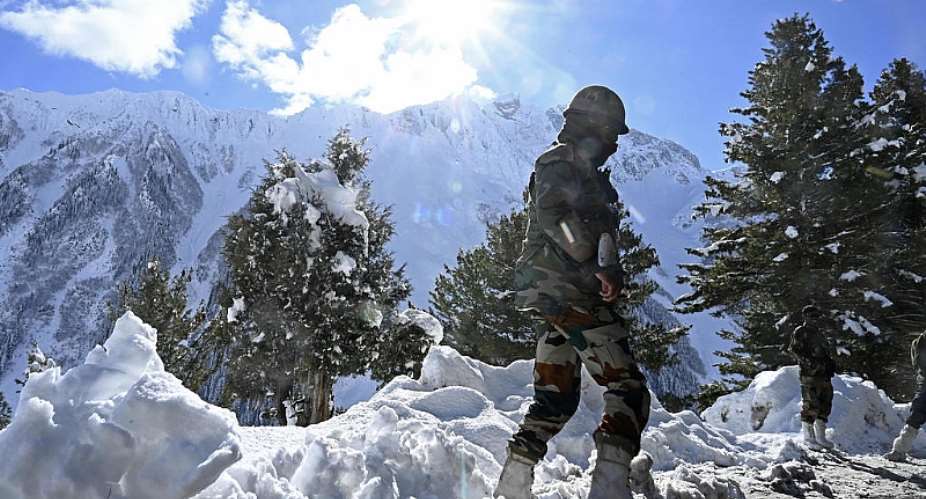India and China have agreed to pull back troops from their disputed border, marking a thaw in their months-long military stand-off in the Himalayas where thousands of frontline soldiers of the two rival armies are deployed.
The announcement came days after a phone call between Indian Prime Minister, Narendra Modi and US President Joe Biden on “regional security issues” and ways to ramp up a four-nation grouping which also include Japan and Australia.
On Thursday, Indian Defence Minister Rajnath Singh said nine rounds of military talks with China resulted in a decision to mutually “disengage” from the banks of a lake in the Indian Himalayas.
"Our sustained talks with China have led to agreement on disengagement on the north and south banks of Pangong Lake,” Singh said.
Pangong stretches from China's autonomous Tibet region to Ladakh in India.
“India and China will remove forward deployments in a phased, coordinated manner," the minister told parliament.
The announcement was seen as key step to reduce tensions that erupted in April when India said Chinese troops tried to sneak across a de facto border into Ladakh in the Himalayas.
'Organised disengagement'
Singh's statement followed a similar announcement by China.
“Frontline units of the Chinese and Indian armed forces in Pangong...began to simultaneously and systematically organise disengagement on February 10," Wu Qian, a Chinese military spokesman, said on Wednesday.
Singh added that military leaders would resume talks on the withdrawal from other frontier sectors within 48 hours after the pull back.
India-China trust deficit
“It is in the interest of both countries to de-escalate because it will make no sense to fight a battle at such treacherous heights,” said former Indian army lieutenant general P.J.S Pannu.
But the general suggested India must “monitor and verify that the intent on the ground is the same as what they are speaking about”.
His comments echoed the growing trust deficit in bilateral Sino-Indian ties.
“The larger reality that confronts China-India ties today is that they have become very volatile and they have become openly hostile,” said Harsh Pant, a strategic analyst from Observer Research Group, a Delhi-based think-tank.
Deadly Himalayan brawl
Tensions came to a head last June when some 100,000 troops backed by artillery and armour were holding ground at friction points along the border Himalayan area in the Galwan Valley.
Violent hand-to-hand clashes broke out, with rival soldiers using rocks, nail-studded clubs and iron bars. Some 20 Indian soldiers were killed.
China suffered casualties but it did not give the number of its soldiers killed or injured.
On Wednesday, Russian news agency TASS reported 45 Chinese soldiers had died.
The two uneasy neighbours, who fought a brief but bloody border war in 1962, have held several rounds of fruitless talks to resolve disputes over their 3,500-kilometre frontiers.





 Akufo-Addo spotted ordering chiefs to stand for his handshake
Akufo-Addo spotted ordering chiefs to stand for his handshake
 Akufo-Addo ‘disrespects’ every chief in Ghana except Okyenhene — NDC Communicato...
Akufo-Addo ‘disrespects’ every chief in Ghana except Okyenhene — NDC Communicato...
 Supreme Court clears way for dual citizens to hold key public positions
Supreme Court clears way for dual citizens to hold key public positions
 Be transparent, don’t suppress the truth – Prof. Opoku-Agyemang to Jean Mensa
Be transparent, don’t suppress the truth – Prof. Opoku-Agyemang to Jean Mensa
 ‘I won’t tell the world I was only a driver’s mate during challenges’ – Prof Jan...
‘I won’t tell the world I was only a driver’s mate during challenges’ – Prof Jan...
 We’ll prosecute corrupt officials of Akufo-Addo’s govt – Prof Jane Naana
We’ll prosecute corrupt officials of Akufo-Addo’s govt – Prof Jane Naana
 [Full text] Acceptance speech by Prof Jane Naana Opoku-Agyemang as 2024 NDC Runn...
[Full text] Acceptance speech by Prof Jane Naana Opoku-Agyemang as 2024 NDC Runn...
 Election 2024: Don’t be complacent, we haven’t won yet – Asiedu Nketia cautions ...
Election 2024: Don’t be complacent, we haven’t won yet – Asiedu Nketia cautions ...
 Election 2024: Stop fighting over positions in Mahama’s next govt – Asiedu Nketi...
Election 2024: Stop fighting over positions in Mahama’s next govt – Asiedu Nketi...
 Prof Jane Naana Opoku-Agyemang will restore dignity of vice presidency – Fifi Kw...
Prof Jane Naana Opoku-Agyemang will restore dignity of vice presidency – Fifi Kw...
